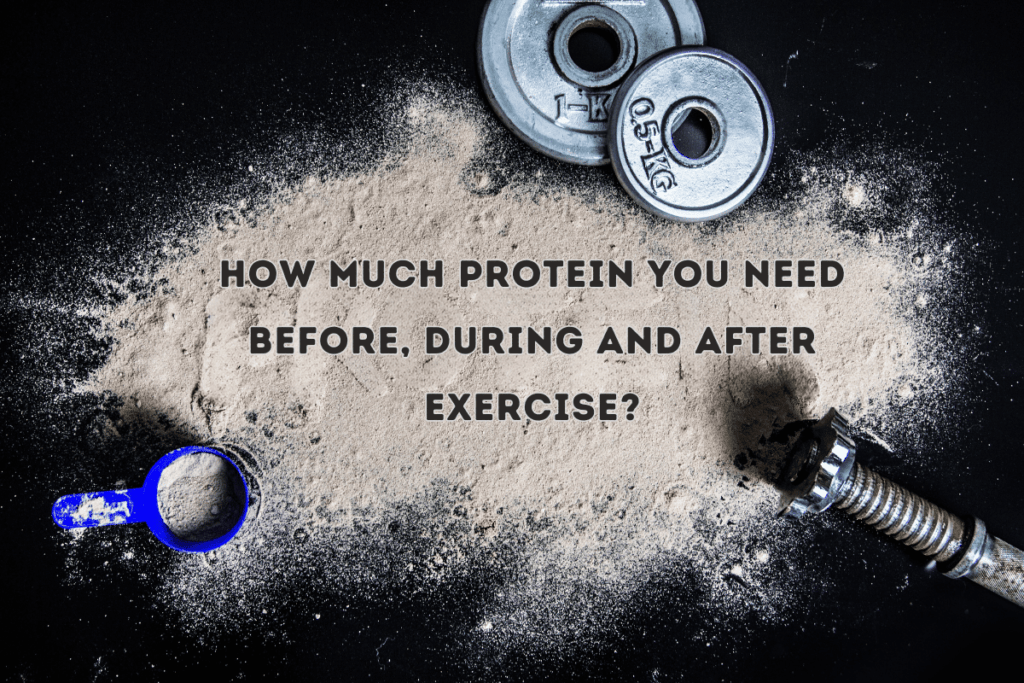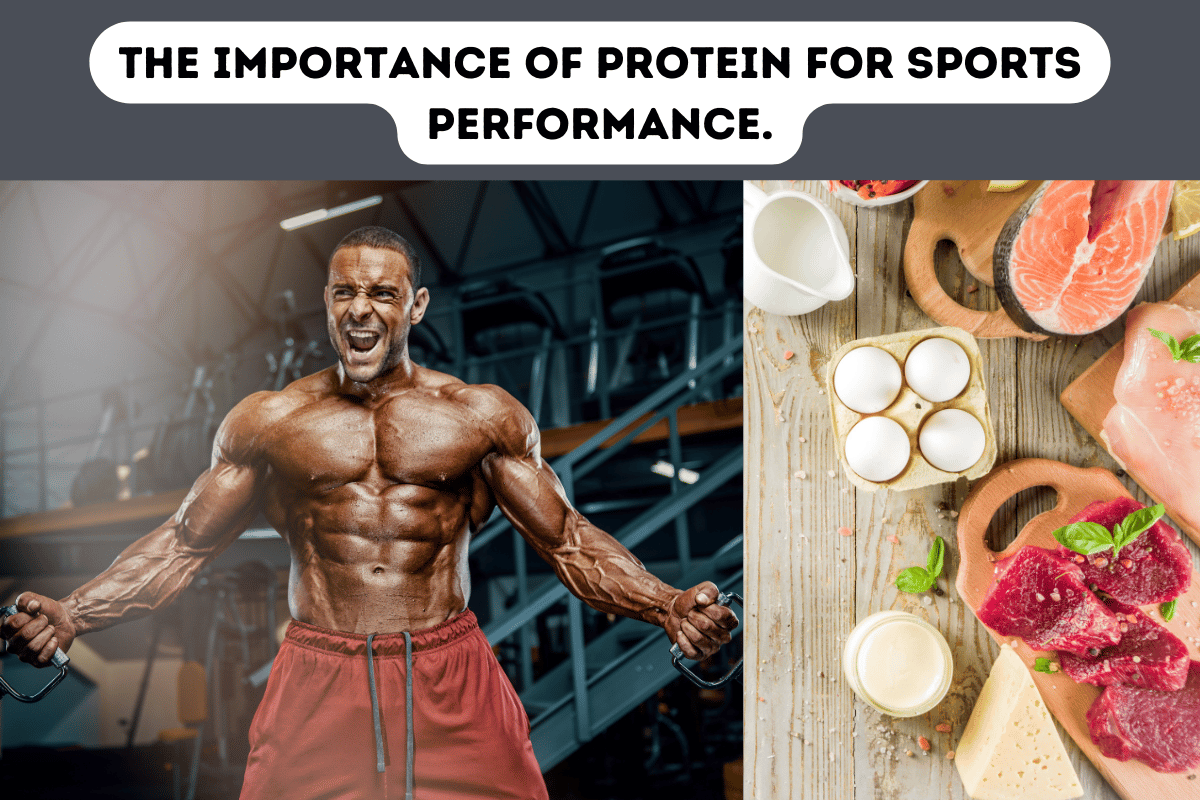In my previous article, “All you need to know about protein”, we discussed protein’s structure, the difference between animal and plant protein, its functions, and how much protein we need. We know that protein is an essential macronutrient for our bodies, not just for muscle growth. It is responsible for many other bodily functions, like building and repairing body tissues, enzymes, and hormone production. In this article, we will discuss the protein requirements for sportspeople and answer questions like: Do we really need more protein for exercise? And if yes, then how much? How much protein do you need before, during, and after exercise? What can happen if we eat too much protein?
Protein needs for endurance, strength and power athletes.
There are two main reasons why protein requirements might be higher for exercisers than non-exercisers. First, amino acids from protein intake are oxidized during exercise to produce energy. Second, protein synthesis increases to repair and replace muscle proteins that are damaged during exercise. Exact protein needs depend on the type, intensity, and duration of training.
During endurance exercise, protein breakdown for energy production is increased. When low glycogen stores, up to 15% of energy production can come from protein. But, when muscle glycogen stores are high, the contribution of protein to energy production is less than 5%. One way of preventing muscle breakdown during exercise is to ensure muscle glycogen stores are high before you start training. This way, much less protein must be broken down for energy. For people involved in endurance exercise, the protein requirement is between 1-1.6 g per kg of body weight, depending on the intensity and duration of the exercise and their training status. At low to moderate exercise intensities of <50% VO2 max (maximal oxygen consumption), protein requirements are not significantly greater than the recommendations for the general population. For an elite endurance athlete, protein requirements are higher.
Strength and power athletes have more protein needs than endurance athletes because protein synthesis increases to repair and replace muscle proteins damaged during exercise. A suboptimal intake of protein will result in slower gains in strength, size, and mass, or even muscle loss, despite hard training. For muscle building, getting 1,5 – 1,8g of protein for 1kg of body weight is necessary. It is important to understand that a high-protein diet alone will not increase strength or muscle size. These goals can be achieved only when an optimal protein intake is combined with heavy resistance (strength) training.
Of course, starting your training session with high muscle glycogen stores is advantageous. This will reduce protein’s contribution to your energy needs at any given point during training. If you are on a weight loss programme, ensure you do not reduce your carbohydrate intake too drastically; otherwise, protein will be used as an energy source, making it unavailable for tissue growth. The protein requirement table is below.
| Type of exercise | Daily protein requirements (g/kg body weight) |
| General population – light exercise | 0.75 |
| Endurance – low to moderate intensity | 1.0 – 1.2 |
| Endurance – moderate to high intensity | 1.2-1.6 |
| Strength and power training | 1.6-2.0 |
Protein and fat loss
When cutting calories to lose body fat, you also risk losing muscle mass. That’s why it’s recommended to increase your protein intake to 1.8–2.7 g/kg BW/day while cutting your daily energy intake by a modest amount (approximately 500 kcal) and including some form of resistance training to prevent lean mass losses. So, you must reduce the number of calories you eat (for example, if your body needs 2500 kcal/day, you must reduce to 2000kcal/day). You must reduce calories by cutting out some carbs from your diet (but don’t exclude them completely). Next, increase the amount of protein, as recommended above, to minimise lean mass loss. You also need to do resistance training to prevent lean mass loss. More about rules for weight loss, you can read in my article: “Your step-by-step weight loss program”. What’s more, it may even be possible to lose fat while gaining muscle – something that most scientists previously believed to be impossible.
Also, protein plays an important role in appetite regulation. It has been shown to promote satiety (the feeling of fullness and reduction in hunger after eating) more than carbohydrates, which is why it is beneficial for weight loss. Protein slows stomach emptying, thus helping you feel full longer. In other words, more protein in your diet will help you eliminate hunger, eat less and feel full. You can read more about the calorie deficit in my article: “The secret of all diets”.
Protein before, during and after exercise.
The timing of your protein intake around exercise is as important as your total daily protein requirement for metabolic adaptation, muscle repair and muscle protein synthesis (MPS). The amount of protein consumed during and after exercise and the type and distribution of protein intake throughout the day all affect the rate of muscle recovery and MPS.

A number of studies suggest that consuming protein plus carbohydrate before and during prolonged, high-intensity exercise stimulates MPS during exercise, minimises protein breakdown, improves recovery from training and results in less muscle damage. It was found that the best is to consume a drink containing equal amounts of protein plus carbohydrate at regular intervals (every 20 minutes) during a 2-hour resistance or endurance workout. It significantly increases MPS rates and reduces protein breakdown during exercise compared with a carbohydrate-only drink. Such drink should contain a carbohydrate to protein ratio of approximately 2:1 or 1:1 (for example, 0.8 g carbohydrate/kg BW plus 0.4 g protein/kg BW).
So, a meal containing carbohydrates and protein should be consumed between 2 and 4 hours before training, leaving enough time for your stomach to settle so that you feel comfortable – not too full and not too hungry. How many carbs should you eat before training, as you can read in my article: “The importance of carbohydrates for sports performance”. As to protein, you should consume around 20-40g before training (about 0.25-0.5 g/kg BW). But the closer you are to the start of your training session, the smaller your meal should be. During training, to reduced protein breakdown during exercise, you can consume a drink containing equal amounts of protein plus carbohydrates, as was shown above.
As to post exercise protein consumption, you will need about 20-40g/kg BW, which is about 0.25-0.5 g/kg BW for an athlete weighing 80 kg. And by the way, you should use a higher dose of protein (40g) just for heavy resistance training (for example leg day). For other more lite training days you can use just 20g of protein before and after exercise. Higher doses of more than 40g will produce no further increase in MPS, and any excess will be used as an energy source (oxidised) or excreted in the urine.
Consuming protein in the post-exercise period is very important because it increases training adaptation and enhances performance for both strength and endurance athletes. For resistance training, protein in your diet is used to rebuild contractile proteins in the muscle fibres (actin and myosin), which, over time, results in bigger, stronger muscles. For endurance training, instead of rebuilding contractile proteins, dietary protein is used to rebuild mitochondrial proteins, which is where energy production occurs (ATP).
Consuming protein immediately after exercise would be advantageous for both resistance and endurance performance. Still, it is unnecessary because the post-exercise anabolic window is wider than the few hours immediately after exercise. This anabolic window, when it is the best to consume protein after training, is opened at least 24 hours (particularly following resistance training), which means it would be beneficial to consume protein throughout the day in equal amounts, not only immediately after exercise. Consuming an optimal amount of protein at regular intervals throughout the day results in a more sustained delivery of amino acids to the muscles and promotes increased MPS. So, consuming protein at 20g per meal every 3-4 hours would be more beneficial than consuming large amount of protein in one meal a day.
Also, if your training session was late in the evening, remember to take some protein before sleep. Casein is the best protein source you can consume before bedtime because it is digested and absorbed relatively slowly and produces a sustained rise in amino acids in the bloodstream.
MILK AS A RECOVERY DRINK
Mostly, especially after resistance training, everybody consumes protein shakes, but did you know that milk is a near-perfect recovery drink for glycogen replenishment, muscle protein synthesis, and rehydration? If you don’t like the taste of simple milk, you can choose chocolate milk, which is even better. Due to its whey content, which is rich in leucine and other branched-chain amino acids, milk is very beneficial for recovery. Plus, chocolate milk contains a 3 to 1 carbohydrate to protein-ratio, giving you the necessary amount of carbs and protein after a workout. Mainly, it is beneficial after endurance exercise.
One study showed that cyclists who consumed chocolate milk after an interval workout could recover faster and perform better than those consuming carbohydrate drinks in an endurance workout. In that study, athletes drank 500 ml of semi-skimmed milk or chocolate milk immediately after training and had less muscle soreness and more rapid muscle recovery compared with commercial sports drinks or water. Also, it was found that chocolate milk not only promotes muscle glycogen recovery but also results in greater aerobic capacity, lean body mass and reduced body fat compared with carbohydrate (sports) drinks. So, if you are tired of protein shakes, want to try something new, and don’t have lactose intolerance, then try chocolate milk after a training session. It should have the same effect that protein shakes do or even better. Plus, chocolate milk is a natural protein source.
IS MORE PROTEIN BETTER?
As we already said, some strength athletes and bodybuilders consume as much as 2–3 g/kg BW/day. However, no evidence exists that these high daily intakes will result in further muscle mass and strength gains. Consuming more protein than you need offers no advantage in health or physical performance. If the protein intake exceeds the body’s protein needs, the excess protein above the body’s requirement will be stored as fat, removed through urea, or used as an energy source.
Too much protein can even damage your kidneys. It may be less likely in healthy individuals with normal kidney function, but for those with existing kidney problems, due to the increased strain that nitrogen excretion places on the kidneys, too much protein can damage their kidneys even more. So, if you already have kidney issues, you should limit your protein intake. Even if you don’t have problems with your kidneys, you need to know that your kidneys must work harder because of excess nitrogen, which will require more water. If you eat too much protein and your fluid intake is too low, you could experience dehydration.




